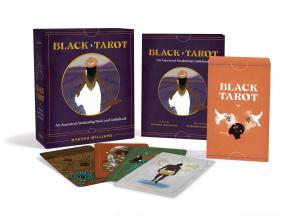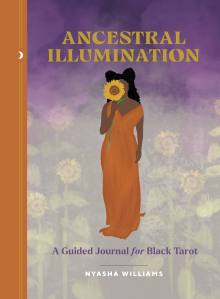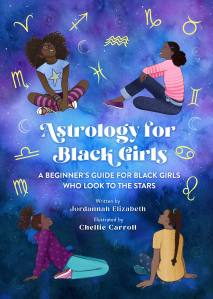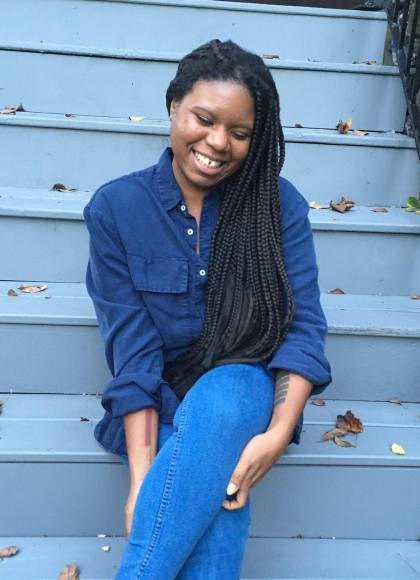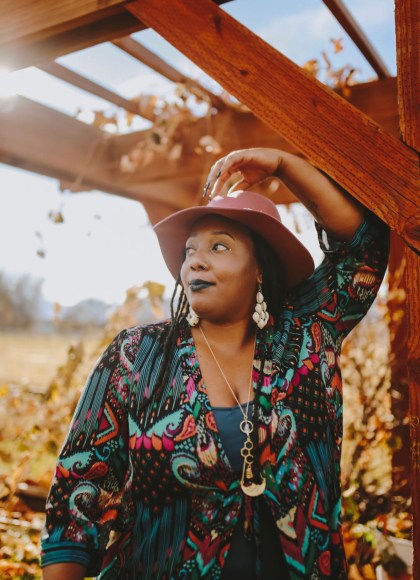Meet the Author: Nyasha Williams of Black Tarot, Interviewed by Jordannah Elizabeth of Astrology for Black Girls
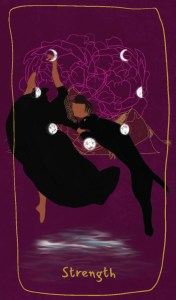
RP Mystic’s offering of tarot decks and journals welcomes the empowering Black Tarot: An Ancestral Awakening Deck and Guidebook and the accompanying Ancestral Illumination guided journal by Nyasha Williams, illustrated by Kimishka Naidoo. Previously, RP Mystic hosted Nyasha as she interviewed Jordannah Elizabeth, author of Astrology for Black Girls. Today, we share Part Two of this series, with Jordannah interviewing Nyasha.
Black Tarot reinterprets the classic 78-card deck with stunningly illustrated Black figures and imagery to awaken ancestral ties and enhance your connection to the divine. The companion journal Ancestral Illumination is filled with prompts, questions, advice, and plenty of writing space to help you chart your tarot journey – plus four full-color sticker sheets. Read on to learn more about the creation of these tools, and their unique place in the African Diaspora!
Jordannah Elizabeth: When did you begin to read tarot cards?
Nyasha Williams: My first exposure to a tarot deck was in college. My then and now best friend, Amber, had a deck, and it piqued my interest. But when I moved back to Colorado in my mid-twenties, I started stepping into the craft. I don’t consider myself a collector in any sense, but children’s books and divination tools are two items that may change that original truth. I started with just reading for siblings and friends, expanding through curious and trusting connections of mutuals. Consensually, I ask before accessing an inquirer’s energy, as divination is an intimate practice. Learning discernment around who to allow to access your energy is no light matter. I take great care in deciding who I get spiritual consultations or readings from. Many of us, including myself, learn this life lesson through boundaries the hard way. I honor all who welcome me to support and connect with spirit as we navigate our soul’s journey.
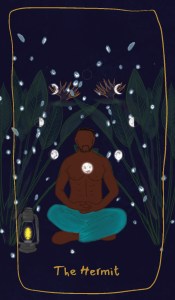
JE: What’s your take on Black mysticism, and why did you decide to create this deck?
NW: This question made me laugh because the answer is far from simple. While there is much to say on the topic, I will get my thoughts across as best as possible.
While as both a descendant of Ancestors who were stolen from Africa and enslaved and a transracial adoptee, I have done my fair share of processing around loss and seeking Ancestral kinship. Decolonizing and indigenizing have been my movement toward liberation. In decolonizing and deconstructing my spirituality, at first glance, I believed that The Church, through colonization and white supremacy, had stomped out our link to our original African spiritual practices. With further examination, traditional religion was kindled by our fore-parents covertly woven within Christian practices, still being carried out today and often our first exposure to rootwork, conjure, and the craft. Even in my Lutheran-Anglican-Mennonite religious background, I experienced traditional practice in churches my family attended.
Ancestors and Deities have been relabeled as Saints; baptisms function as spiritual baths and cleansings; possession as catching the Holy Ghost; light language voiced as speaking in tongues; offerings and sacrifices as tithing and communion; Ancestral altars as church altars; songs, spells, and manifestations are spoken as prayer; and oils, mojo bags, talismans, and divination tools operate as the cross, anointing oil, incense, the Bible, and rosaries. The ‘old ways’ or traditions of Black mysticism are more than superstitions used to connect with or repel spirits but are a system of beliefs built around Ancestral connection and wisdom.
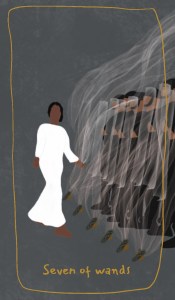
Before brick-and-mortar Black churches were built as sanctuaries to convert to Christianity cosmetically, we made our own ‘church’ spaces. We connected in tobacco fields, at riverbanks, in secret cabin meetings at night, within the trees and wilderness of parts of the Underground Railroad, and in the song of Negro Spirituals. Our Blackness was our first church home.
The United States was born into Christianity. As a people, we were not. We are born into the lineage and survival of our Ancestors, carried in our DNA. Our ancestors are us and we are our ancestors. Our blood knows that nothing is new. The way our hearts beat in rhythm when we hear drumming. Why our community dreams of fish when someone is pregnant? We cannot appropriate African or Diasporic Traditions that are ours. We must, however, acknowledge that we can cause the same systemic harm as anyone if we don’t decolonize and decenter whiteness. We are generations deep in spiritual double consciousness. It is both captivating and disheartening in the ways we know and unknow ourselves. The unknowing stems from fear and colonial attempts to disbar us from being practitioners or becoming privy to how Black mysticism permeates our daily lives.
There is much to the world that cannot be seen or understood by the bare eye. If interested in beginning, start in a place of grounding – cleansing, protection, shadow healing, and work. We naturally do this work communally in places of worship. Take time to reconceptualize and feel out what this practice looks like at home, openly living out our traditional practices.
I wrote the deck in the movement of uncloaking Black mysticism while reclaiming my Ancestral divination traditions. Decks were the first tool I started working with, but as much as I resonated with the practice of tarot, I struggled to find a deck that felt perfectly aligned for me, visually and in the message. I started reimagining the tarot deck, and the Ancestors spoke through me to shape the message. The journal complements the deck to aid in helping encourage reading rituals and gratitude as everyday practice.
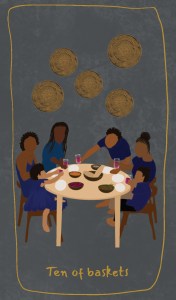
JE: How did you land on the final illustrations, and how do they inspire you?
NW: The deck illustrations were part of reimagining the Rider-Waite deck. I have never visually aligned to Rider-Waite, and I wanted to change due to the lack of diversity in divination decks. In deciding what visual went on each card, I sat with the meanings of each card and allowed inspiration to flow around what image would best embody its energy. My inspiration comes from the illustrator magic of my high school friend, Kimishka. She resonated with and heard my vision for the deck artistically and carried out my voice beautifully. I get immense joy from seeing the gorgeous drawings of Black community working to provide clarity, guidance, and inspiration through engaging with the deck.
Let your guiding spirits and ancestral figures come through with this stunningly illustrated tarot deck and guidebook. Black Tarot is the tarot deck you’ve been missing, complete with 78 tarot cards featuring all Black representations of classic tarot figures and iconography (The Sun, The Moon, Judgement, etc.). An accompanying illustrated guidebook with information on each card including traits, descriptions, action steps, flower, element, chakra, affirmations, and more. Throughout, find lessons on how the moon's cycle and the element of water influence your life, your readings, and your connections with the divine.
- DELUXE SET: This set includes 78 full-color illustrated tarot cards (3 X 5 inches), shrink wrapped in an interior travel case; a 144-page, full-color illustrated flexibind book (4 3/4 X 6 inches); and a keepsake magnetic closure box with a flocked tray and metallic highlights on the box and cards.
- FULLY ILLUSTRATED TAROT GUIDEBOOK: A 144-page full-color guidebook explaining how to best use the cards is included.
- ORIGINAL ILLUSTRATIONS: Each card features stunning art created exclusively for this tarot deck and guidebook.
Dive into this beautifully designed journal, filled with prompts, questions, tarot advice, plenty of writing space, and more to help you record and reflect on your tarot journey. This journal is a companion to Black Tarot, a tarot deck and guidebook that draws influence from the moon and the water and features exclusively Black figures. Customize your journal and chart your own tarot journey with the four enclosed sticker sheets.
- SPECIFICATIONS: 6 inch by 8-inch, 176-page flexibind journal
- DELUXE PACKAGING: This guided journal is full-color inside and out, with beautiful illustrations
- STICKER SHEETS INCLUDED: Includes 4 sheets of full-color stickers
- PAIRS WITH TAROT DECK: This guided journal is a companion guide to Nyasha Williams's Black Tarot
Astrology for Black Girls gives young girls information and context for the core foundations of the Zodiac. This book provides the perfect introduction to the sun, moon, rising signs, and more. Speaking directly to black girls, author and life-long astrology practitioner Jordannah Elizabeth address:
- Practicing both Faith and Astrology
- Talking to Family and Friends about the stars
- Using the Zodiac for discovery and understanding





